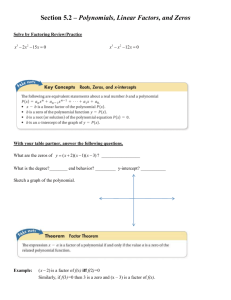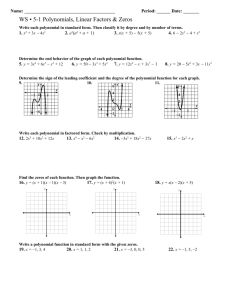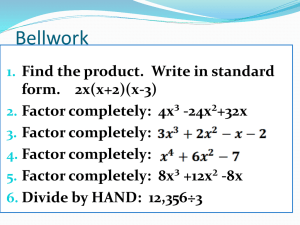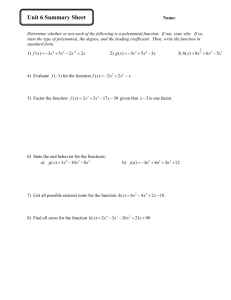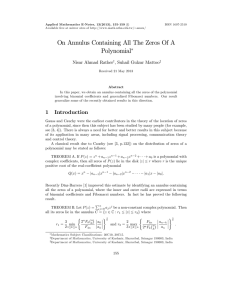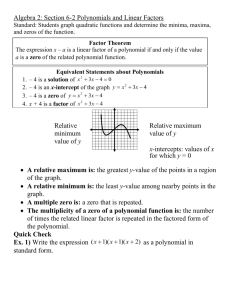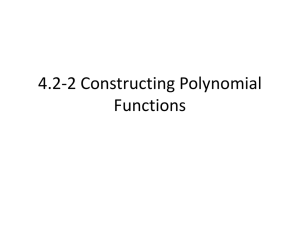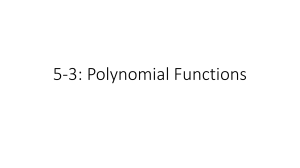Document 10677546
advertisement
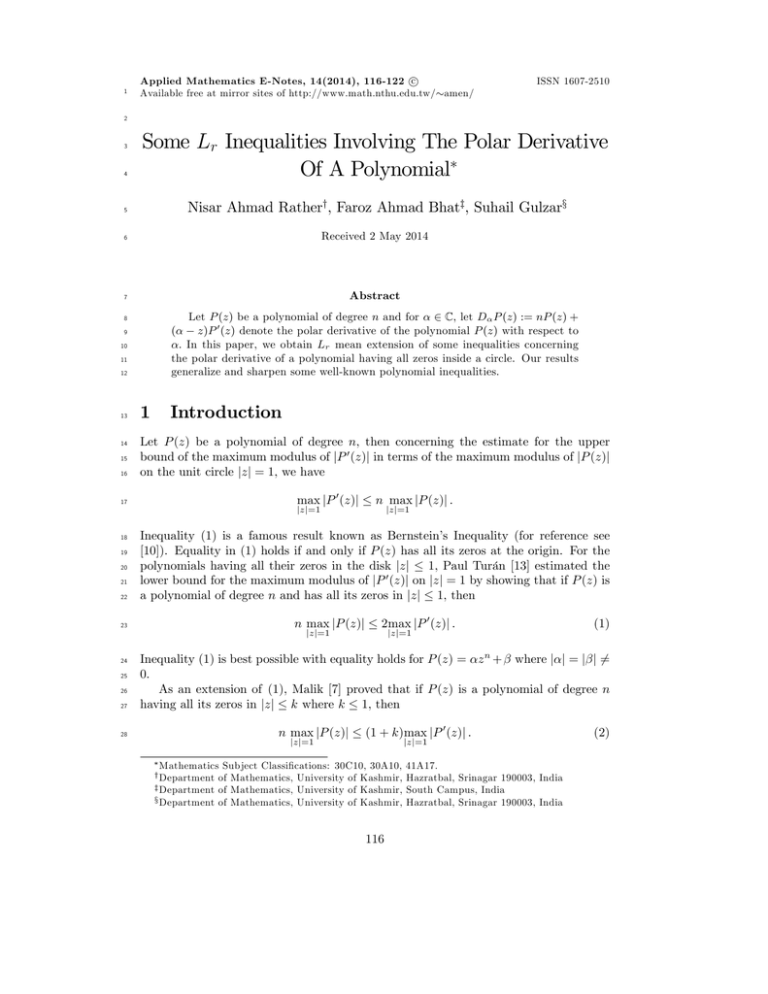
1 Applied Mathematics E-Notes, 14(2014), 116-122 c Available free at mirror sites of http://www.math.nthu.edu.tw/ amen/ ISSN 1607-2510 2 3 4 Some Lr Inequalities Involving The Polar Derivative Of A Polynomial Nisar Ahmad Rathery, Faroz Ahmad Bhatz, Suhail Gulzarx 5 6 Received 2 May 2014 7 Abstract Let P (z) be a polynomial of degree n and for 2 C; let D P (z) := nP (z) + z)P 0 (z) denote the polar derivative of the polynomial P (z) with respect to : In this paper, we obtain Lr mean extension of some inequalities concerning the polar derivative of a polynomial having all zeros inside a circle. Our results generalize and sharpen some well-known polynomial inequalities. 8 ( 9 10 11 12 13 14 15 16 1 Introduction Let P (z) be a polynomial of degree n; then concerning the estimate for the upper bound of the maximum modulus of jP 0 (z)j in terms of the maximum modulus of jP (z)j on the unit circle jzj = 1; we have max jP 0 (z)j 17 jzj=1 18 19 20 21 22 n max jP (z)j jzj=1 25 26 27 jzj=1 Inequality (1) is a famous result known as Bernstein’s Inequality (for reference see [10]). Equality in (1) holds if and only if P (z) has all its zeros at the origin. For the polynomials having all their zeros in the disk jzj 1; Paul Turán [13] estimated the lower bound for the maximum modulus of jP 0 (z)j on jzj = 1 by showing that if P (z) is a polynomial of degree n and has all its zeros in jzj 1; then 23 24 n max jP (z)j : 2max jP 0 (z)j : jzj=1 (1) Inequality (1) is best possible with equality holds for P (z) = z n + where j j = j j = 6 0: As an extension of (1), Malik [7] proved that if P (z) is a polynomial of degree n having all its zeros in jzj k where k 1, then n max jP (z)j 28 jzj=1 (1 + k)max jP 0 (z)j : jzj=1 Mathematics Subject Classi…cations: 30C10, 30A10, of Mathematics, University of Kashmir, z Department of Mathematics, University of Kashmir, x Department of Mathematics, University of Kashmir, y Department 116 41A17. Hazratbal, Srinagar 190003, India South Campus, India Hazratbal, Srinagar 190003, India (2) Rather et al. 29 30 31 32 33 34 35 36 37 117 Equality in (2) holds for P (z) = (z + k)n where k 1: Pn On the other hand, for the class of polynomials P (z) = an z n + j= an j z n j ; 1 n; of degree n having all their zeros in jzj k; k 1; Aziz and Shah [5] proved that n min jP (z)j: (3) n max jP (z)j (1 + k )max jP 0 (z)j n k jzj=k jzj=1 jzj=1 Malik [8] obtained a generalization of (1) in the sense that the left-hand side of (1) is replaced by a factor involving the integral mean of jP (z)j on jzj = 1: In fact, he proved that if P (z) is a polynomial of degree n having all its zeros in jzj 1; then for each q > 0; n 38 ( Z2 P ei q d 0 39 40 41 n ( Z2 P e i q 0 44 45 46 47 48 n ( Z2 P ei r d 52 53 54 55 56 57 1 + ei d 0 ) q1 maxjP 0 (z)j: (4) jzj=1 d ( Z2 ) q1 1 + ke i q d 0 ) q1 maxjP 0 (z)j: (5) jzj=1 ) r1 ( Z2 1 + kei 0 qr d 1 ( 2 ) qr Z jP 0 (ei )jpr d 0 1 ) pr (6) Let D P (z) denote the polar derivative of a polynomial P (z) of degree n with respect to a point 2 C; then (see [9]) D P (z) = nP (z) + ( 50 51 q Inequality (5) reduces to the inequality (2) by letting q ! 1; . As a generalization of (5), Aziz and Ahemad [2] proved that if P (z) is a polynomial of degree n having all its zeros in jzj k where k 1; then for each r > 0; p > 1; q > 1 with p 1 + q 1 = 1; 0 49 ( Z2 The corresponding extension of (2), which is a generalization of (4), was obtained by Aziz [1] who proved that if P (z) is a polynomial of degree n having all its zeros in jzj k where k 1; then for each q 0 42 43 ) q1 z)P 0 (z): The polynomial D P (z) is of degree at most n 1 and it generalizes the ordinary derivative in the sense that D P (z) lim = P 0 (z) !1 uniformly with respect to z for jzj R and R > 0: As an extension of (2) to the polar derivative, Aziz and Rather [3] proved that if all the zeros of P (z) lie in jzj k where k 1; then for 2 C with j j k; n(j j k) max jP (z)j jzj=1 (1 + k)max jD P (z)j : jzj=1 (7) 118 58 59 60 Lr Inequalities Involving the Polar Derivative of a Polynomial Pn For the class of lacunary type polynomials P (z) = an z n + zn ; 1 = an n; of degree n having all their zeros in jzj k where k 1; Aziz and Rather [4] also proved that if for 2 C with j j k ; n(j j 61 62 63 64 65 k )max jP (z)j n (j j + 1) n (j j k ) max jP (z)j + n min jP (z)j: 1+k k (1 + k ) jzj=k jzj=1 max jD P (z)j jzj=1 68 69 70 71 72 73 74 75 76 77 78 79 80 81 82 83 84 85 86 (8) jzj=1 As a re…nement of inequality (8), and an extension of inequality (3) to polar derivPn ative, Rather and Mir [12] proved that if P (z) = an z n + j= an j z n j ; 1 n; is a polynomial of degree n having all its zeros in jzj k; k 1; then for 2 C with j j k ; 66 67 (1 + k )max jD P (z)j : jzj=1 2 (9) Main Results In this paper, we …rst extend inequality (6) to the polar derivative and prove the following result. THEOREM 1. If P (z) is a polynomial of degree n having all its zeros in jzj k where k 1; then for ; 2 C with j j k; j j 1 and for each r > 0; p > 1; q > 1 with p 1 + q 1 = 1; ( Z2 ) r1 r m i P (e ) + n 1 d n(j j k) k ( Z2 0 i pr j1 + ke j d 0 1 ( 2 ) pr Z i D P (e ) mn kn 1 qr d 0 1 ) qr (10) where m = minjzj=k jP (z)j: REMARK 1. By letting r ! 1 and choosing the argument of in the left side of inequality (10) suitably, we obtain a result due to Aziz and Rather [3]. Instead of proving Thereon 1, we prove the following more general result which is also Lr mean extension of (9). Pn THEOREM 2. If P (z) = an z n + zn ; 1 n; is a polynomial of = an degree n having all its zeros in jzj k where k 1; then for ; 2 C with j j k ; j j 1 and for each r > 0; p > 1; q > 1 with p 1 + q 1 = 1; ) r1 ( Z2 r m i n(j j k ) d P (e ) + n k ( Z2 0 0 i pr j1 + k e j d 1 ( 2 ) pr Z 0 i D P (e ) mn kn qr d 1 ) qr (11) Rather et al. 87 88 89 90 91 92 where m = minjzj=k jP (z)j: If we let q ! 1; in (11) so that p ! 1; we obtain the following result. Pn COROLLARY 1. If P (z) = an z n + zn ; 1 n; is a polynomial of = an degree n having all its zeros in jzj k where k 1; then for ; 2 C with j j k ; j j 1 and for each r > 0; ) r1 ( Z2 r m i d P (e ) + n n(j j k ) k ( Z2 93 0 j1 + k ei jr d 0 94 95 119 ) r1 ( mn kn max D P (z) jzj=1 ) where m = minjzj=k jP (z)j: 98 REMARK 2. Again, letting r ! 1 and choosing the argument of of inequality (12) suitably, we obtain inequality (9). For the proof of Theorem 2, we need the following Lemma. 99 3 96 97 100 101 102 The following Lemma holds due to N. A. Rather [11]. Pn LEMMA 1. If P (z) = an z n + zn ; 1 n; is a polynomial of degree = an almost n having all its zeros in in jzj k where k 1, then for jzj = 1; jQ0 (z)j + nm kn k jP 0 (z)j 104 where Q(z) = z n P (1=z) and m = minjzj=k jP (z)j: 105 4 107 108 109 110 111 112 113 in the left side Lemma 103 106 (12) (13) Proof of Theorem 2 In this section, we prove Theorem 2. Let Q(z) = z n P (1=z); then P (z) = z n Q(1=z) and it can be easily veri…ed that for jzj = 1; jQ0 (z)j = jnP (z) zP 0 (z)j and jP 0 (z)j = jnQ(z) zQ0 (z)j: (14) By Lemma 1, we have for every Q0 (z) + with j j nmz n kn 1 1 and jzj = 1; jQ0 (z)j + nm kn k jP 0 (z)j: (15) Using (14) in (15), we get for jzj = 1; Q0 (z) + nmz n kn 1 k jnQ(z) zQ0 (z)j: (16) 120 114 115 116 117 118 119 120 Lr Inequalities Involving the Polar Derivative of a Polynomial Again, by Lemma 1 for every real or complex number with j j k and jzj = 1; we have mn jD P (z)j j j jP 0 (z)j jQ0 (z)j (j j k ) jP 0 (z)j + n ; k so that mn (j j k )jP 0 (z)j: jD P (z)j (17) kn Since P (z) has all its zeros in jzj k 1; it follows by Gauss-Lucas Theorem that all the zeros of P 0 (z) also lie in jzj k 1: This implies that the polynomial zn 121 122 1 P 0 (1=z) zQ0 (z) nQ(z) does not vanish in jzj < 1: Therefore, it follows from (16) that the function nmz n 1 kn k (nQ(z) zQ0 (z)) z Q0 (z) + w(z) = 123 124 125 126 is analytic for jzj 1 and jw(z)j 1 for jzj = 1: Furthermore, w(0) = 0: Thus the function 1 + k w(z) is subordinate to the function 1 + k z for jzj 1: Hence by a well known property of subordination [6], we have Z2 127 Z2 r i 1 + k w(e ) d Now n Q(z) + 1 + k w(z) = 129 130 jP 0 (z)j = jz n n Q(z) + 1 nQ(z) P 0 (1=z)j = jnQ(z) mz n = j1 + k w(z)j jnQ(z) kn Equivalently, mz n kn zQ0 (z) ; zQ0 (z)j for jzj = 1; This implies n P (z) + 137 m = j1 + k w(z)jjP 0 (z)j for jzj = 1: kn 138 From (17) and (19), we deduce that for r > 0; 139 nr (j j k )r Z2 0 P (ei ) + m kn zQ0 (z)j = j1 + k w(z)jjP 0 (z)j: mz n = j1 + k w(z)jjP 0 (z)j: kn n z n P (1=z) + 135 136 (18) therefore for jzj = 1; 133 134 d ; r > 0: and 131 132 r 0 0 128 1 + k ei r d Z2 0 1 + k w(ei ) r D P (ei ) (19) mn kn r d : 140 141 142 Rather et al. 121 This gives with the help of Hölder’s inequality and (18), for p > 1; q > 1 with p q 1 = 1; 1 r n (j j k ) r Z2 P (ei ) + 0 143 146 147 148 pr equivalently, n(j j 82 <Z : k ) r m d kn 11=p 0 2 Z n D P (ei ) d A @ 0 0 144 145 02 Z @ 1 + k ei 82 <Z : 1 + k ei P (ei ) + 0 pr 0 which proves the desired result. d m kn 1 8 9 pr = <Z2 ; : + 0 r d 11=q mn oqr A d ; kn 9 r1 = ; D P (ei ) mn kn qr d 1 9 qr = ; 151 Acknowledgment. The authors are highly grateful to the referee for his valuable suggestions and comments. The third author is supported by Council of Scienti…c and Industrial Research, New Delhi, under grant F.No. 09/251(0047)/2012-EMR-I. 152 References 149 150 153 154 155 156 157 158 159 160 161 162 163 164 165 166 [1] A. Aziz, Integral mean estimates polynomials with restricted zeros, J. Approx. Theory, 55(1988), 232–239. [2] A. Aziz and N. Ahemad, Integral mean estimates for polynomials whose zeros are within a circle, Glas. Mat. Ser. III, 31(1996), 229–237. [3] A. Aziz and N. A. Rather, A re…nement of a theorem of Paul Turan concerning polynomials. Math Ineq. Appl., 1(1998), 231–238. [4] A. Aziz and N. A. Rather, Inequalities for the polar derivative of a polynomial with restricted zeros, Math. Balk., 17(2003), 15–28. [5] A. Aziz and W. M. Shah, An integral mean estimate for polynomial, Indian J. Pure Appl. Math., 28(1997), 1413–1419. [6] E. Hille, Analytic Function Theory. Vol. II. Introductions to Higher Mathematics Ginn and Co., Boston, Mass.-New York-Toronto, Ont. 1962. [7] M. A. Malik, On the derivative of a polynomial, J. Lond. Math. Soc., Second Series 1(1969), 57–60. 122 167 168 169 170 171 172 173 174 Lr Inequalities Involving the Polar Derivative of a Polynomial [8] M. A. Malik, An integral mean estimates for polynomials, Proc. Amer. Math. Soc., 91(1984), 281–284. [9] M. Marden, Geometry of Polynomials. Second Edition. Mathematical Surveys, No. 3 American Mathematical Society, Providence, R.I. 1966. [10] G. V. Milvonic, D. S. Mitrovonic and Th. M. Rassias, Topics in Polynomials: Extremal Problem, Inequalities, Zeros, World Scienti…c, Singapore, 1994. [11] N. A. Rather, Extremal properties and Location of the zeros of polynomials, Ph.D. Thesis, University of Kashmir, 1998. 177 [12] N. A. Rather and M. I. Mir, Some re…nements of inequalities for the polar derivative of polynomials with restricted zeros, Int. J. Pure and Appl. Math., 41(2007), 1065–1074. 178 [13] Paul Turán, Über die Ableitung von Polynomen, Compos. Math., 7(1939), 89–95. 175 176
